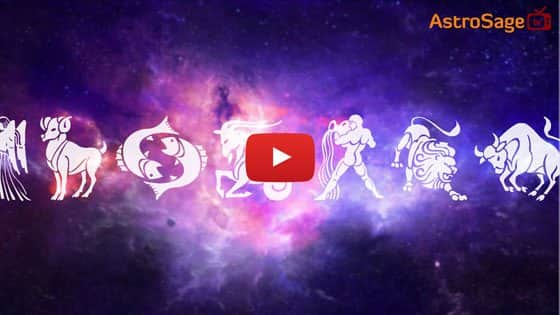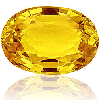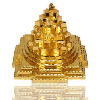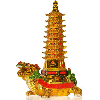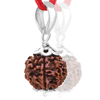Diwali 2017 - The Festival Of Lights
Diwali, the festival of lights, come every year with many sacred meanings and opportunities for everyone to make their lives even better. Here, we will give you all the required details about this festival.
When is Diwali in 2017?
In 2017, Diwali will be celebrated on October 19.
When Is Diwali Celebrated?
Every year, Deepavali is celebrated on the Amavasya (New Moon) of the Hindu month Kartik. This month falls between October and November, as per the Gregorian calendar. The festival of Diwali runs for 5 days. The third day is known as the main Diwali festival. The series of the 5-day Diwali festival is given below:
- First day - Dhanteras
- Second day - Narak Chaturdashi, Chhoti Diwali
- Third day - Diwali
- Fourth day - Govardhan Puja
- Fifth day - Bhai Dooj
Diwali Muhurat In 2017
- Lakshmi Puja Muhurat: 19:13:36 to 20:19:22
- Pradosh Kaal: 17:48:02 to 20:19:22
- Vrishabh Kaal: 19:13:36 to 21:09:25
Diwali
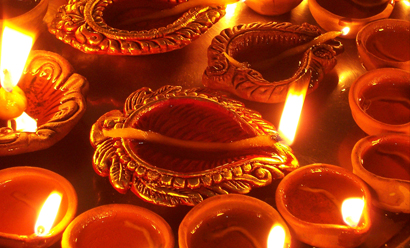
Diwali in 2017 will again begin with Dhanteras. Dhanteras of Diwali in 2017 is on October 17. Festival of Dhanteras is considered to be an important dateline. On Diwali, Dhanteras marks the coming of prosperity in the house when people can buy precious items made of gold, silver, etc.
Chhoti Diwali in 2017 is on October 18. The second day of Deepawali festival is going to be celebrated as Naraka Chaturdashi.
Badi Diwali is on October 19, 2017. Lakshmi Puja will be performed on the most important day of Deepawali festival. The third day of Diwali is going to be followed by Govardhan Puja on the fourth Diwali day. It is on October 20, 2017.
Diwali ends with Bhaiya Dooj on October 21. Diwali is one of the most awaited Hindu festivals. The festival of Deepawali is expected to bring joy, happiness, and moments of togetherness in the Hindu community.
What Is Diwali ?
In Deepavali, 'Deep' signifies light and 'Avali' signifies a row of lights; hence, it is usually called as 'Festival Of Lights'. It is a five-day celebration.
- Observances: Lights, shopping, fireworks, decoration of house, Ganesh puja, sweets, Govardhan puja, Bhai dooj
- Type of Holiday: Religious Holiday
Diwali Celebration
On the eve of Diwali, people light lamps (Diyas) and place them all around their homes. Lighting of lamps is one of the ways for paying gratitude toward God to get good health, knowledge, wealth, peace, and fame.
On Deepavali eve, people from all age groups participate and enjoy the festivity of this festival. On Deepawali, people exchange sweets and the eve is celebrated with firing crackers, explosion of fireworks.
It is a five-day celebration, where each and every day has a different tradition and importance. However, the theme of all the celebrations is just the same i.e. destruction of evil and victory of truth.
Significance Of Lighting A Lamp & Firecrackers
On Deepavali, every home is lit with a lamp. But, most of us may not be aware of the fact of lighting lamps and its significance. Each and every ritual of Diwali has an important significance and a reason for them. Lighting a lamp and using fire-crackers have a logical reason to tell.
It is an ultimate truth that light is the prime reason that helps us to see things around us. Almost every civilization has accepted the importance of light as one of the best bounties gifted by God to mankind.
Light signifies positivity & knowledge while darkness signifies ignorance. Hence, lighting a lamp means removal of ignorance & welcoming knowledge, destruction of evil in hearts, greed, sufferings, envy, violence, and negativity. Lighting a lamp, lights the lives of people along with indicating happiness ahead.
Diwali Legends
Deepavali has many legends associated with it. As there are many different regions in India, so are the legends. Let's have a look at some of the major legends before we celebrate Deepawali.
Lord Rama's Return To Ayodhya
Let's read out the first legend associated with the festival of Diwali or Deepavali. Lord Rama has been remembered as the idol of truth, personification of morality, and an ideal son & husband. But, most importantly, he was an ideal King. Lord Rama had a war with Ravana and he got victory. Then, victorious Rama, Sita, and Laxman returned back to Ayodhya.
People became very happy and all of them raised a slogan of 'Victory to Rama, Victory to Hanuman'. In Ayodhya, Lord Rama's brother Bharata was eagerly waiting for his arrival.
At the return of Rama, Sita, and Laxman; people of Ayodhya enjoyed the day by lighting mud lamps and firecrackers. Ayodhya was decorated all around by garlands and flowers. Every house was cleaned and houses were filled with essence of perfumes and scent. The same custom is being followed till now. People still celebrate the return of Lord Rama to Ayodhya as Dipawali.
Narakasura Killed By Satyabhama
Now, it's turn to know about the second legend associated with the festival of Diwali. Narakasura or Naraka was a demon King who ruled kingdom of Pradyoshapuram; but he was a brutal ruler. Naraka Chaturdashi is an important day of Deepawali festival, which is celebrated as the demise of Narakasura. But, what relevance can a demon hold in mythology that a day is celebrated on his annihilation in Dipavali? Want to know the tale of Narakasura? Let's proceed.
People were kidnapped and forced to do unwanted tasks by demon Narakasura. So, the villagers went to Lord Krishna to ask for help. But, Narakasura had a boon that he will get death only by his mother. His mother also had a boon that her son would die when she will wish for his death. Satyabhama was an incarnation of Bhudevi.
When Lord Krishna went to kill Narakasura, he accompanied Sathyabama with him. When Krishna became unconscious, Satyabhama took up the charge; she hit Naraka and he was killed. Death of demon Narakasura made villagers free from all sufferings, and they celebrated and rejoiced on the occasion.
So, killing Narakasura signifies that if a child goes on a wrong path, parents have the right to stop them by hook or crook. Hence, the day is also celebrated as Narak Chaturdashi Parva signifying that welfare of mankind is above any personal relation.
It is also believed that Lord Krishna took bath from oil on this day to remove Narakasura's blood from his body. This tradition is still followed on Naraka Chaturdashi. A day before Naraka Chaturdashi, people offer prayer to the vessel in which they heat up water for taking bath. Along with this, they light up firecrackers as a symbol of happiness on this very day of Deepavali.
Appearance Of Goddess Lakshmi
Goddess Lakshmi is considered the Goddess of wealth, as per the Hindu mythology. People worship Goddess Lakshmi on the eve of Diwali. The reason behind paying reverence to Lakshmi Devi on Deepavali is a story of obtaining Amrit (immortal nectar) after churning mount Mandara. While churning Mount Mandara, Goddess Lakshmi appeared from it. She chose Lord Vishnu as her husband. Since then, it is believed that whenever Lord Vishnu comes down on earth as an Avatar, he is always accompanied by Goddess Lakshmi.
Goddess Lakshmi is worshiped on Diwali, as she symbolizes good luck. She is believed to be the Goddess of prosperity, health, beauty, peace, strength, and most importantly, wealth.
Deepavali As A Harvest Festival
Deepavali is also celebrated as a harvest festival in India. Diwali takes place when the cropping season ends. Instead, other than this fact, there are many more customs that would tell us that Deepawali is a harvest festival. In earlier times also, reaping of harvest brought happiness and prosperity in the lives of farmers.
Hence, even now the farmers celebrate the harvesting time with joy and offer prayers to God for yielding good harvest during Diwali or Deepavali. In old days, farmers used to worship Goddess Lakshmi, the Goddess of wealth.
On Deepawali, farmers perform an Aarti and prepare dishes made of rice taken from the harvest. This custom is followed all over in India in rural and urban areas. October-November is the time when Kharif harvesting season ends. This is also one of the reasons for considering Deepavali as a harvest festival.
Significance of Diwali
Let's know about the significance of Diwali festival by taking a detailed look at all the five days of Deepavali.
Dhanteras Celebrations
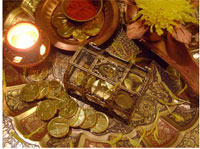
Dhanteras commences the five-day celebrations of Diwali. It is also known as 'Dhantrayodashi' or 'Dhanvantari Trayodashi'. It is celebrated on the thirteenth day of Krishna Paksha (dark fortnight) of the Hindu month Kartik.
On the occasion of Dhanteras, Goddess Lakshmi, also known as Dhan Lakshmi, is worshiped. It is believed that worshiping her on this first day of Diwali helps in bringing wealth and prosperity. Some people also worship Lord Kubera on Dhanteras as he is considered to be the owner of all the treasure and wealth. It is considered auspicious to buy new things for household on the day of Dhanteras. Especially, the kitchen utensils made of brass, copper or iron, are brought on the first Deepawali day. Silver based jewelry is also bought on Dhanteras. People also send gifts to others on this day, while those who can not gift anything to anyone, just send their wishes in the form of Dhanteras messages .
Choti Diwali Celebrations
The second day of celebrations is known as Chhoti Diwali. It is called so because it comes a day before Deepawali. Choti Diwali is also known as Narak Chaturdashi as a demon named Narakasura was killed on this day. On the day of Choti Diwali, people also light lamps but on a smaller scale in comparison to Badi Diwali or the main Deepavali.
Night of Lights: Diwali
The much awaited festival of lights marks the third day of celebrations. On the
Diwali night, people worship Goddess Lakshmi to bring prosperity, light of knowledge,
and wealth. It is said that on the occasion of Deepavali, all the homes should be
neat and clean, as Goddess Lakshmi visits the cleanest place first. On the night
of Diwali, Goddess Lakshmi comes on earth to bestow her blessings on human beings.
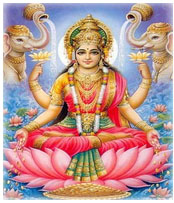
Along with her, Lord Ganesha is also worshiped on Diwali or Diwali, as he is the one who is worshiped before initiating any good task. Lakshmi Puja on Diwali, people lit lamps and then children and elders, all use firecrackers.
Why Lord Ganesha Is Worshiped First In All Pujas?
Govardhan Puja
Govardhan Puja is performed on the fourth day of Diwali. Govardhan Puja is the ritual followed to worship the hillock of Govardhan. It also has a story associated with it that says that once Lord Indra became angry on the people of Mathura as Lord Krishna told them not to worship Indra. This made Indra very angry and he sent a huge amount of rain to harm people of Mathura. But, Lord Krishna assured everyone that they will be saved and he lifted up Govardhan Parvat to save the people.
This way, Lord Krishna proved that Indra is not the supreme God. Indra also accepted the supremacy of Lord Krishna. Since then, people of Bihar, Uttar Pradesh, Haryana, and many other states build small hillocks by cow dung and decorate them with flowers on this fourth day of Diwali. People then gather at a place to worship them.
Bhai Dooj
The festival of Bhai Dooj is celebrated on the last Diwali day to strengthen the bond of a sister and brother. Sisters put a Tilak on the foreheads of their brothers and pray for their long lives on Bhai Dooj. In return, brothers offer gifts to their loving sisters. The festival of Bhai Dooj is celebrated to increase the love and bonding between the brothers ans sisters forever.
It's Time To Celebrate!
As we have discussed the rituals and traditions to be followed on Diwali, now it's turn to take a look at the five-day Diwali festival from an ambient angle. Let's know more about the things we can do during the festival of Diwali that would add ambience and color to our lives.
Lighting Lamps Around the House
On the night of Deepavali, lamps are lighted all around the house and in the verandas. Lighting a lamp on Diwali indicates that darkness of ignorance should be removed from life and light of knowledge should be welcomed during Diwali. It is believed that if a house is not lit up by lamps, Goddess Lakshmi does not visit that house on the night of Deepawali.
Lighting Fire-crackers
After completing the Lakshmi Puja on Diwali night, all the family members light fire-crackers. Especially, the children get very excited about lighting fire-crackers. Children don't even wait for the Puja to be completed, as they are so excited to light fireworks. On the occasion of Deepavali, many localities even organize competitions for lighting fireworks.
Making Rangolis
On the day of Deepavali, people make beautiful Rangolis (floor patterns) at the main entrance that are made by using different powder colors. It is considered as a very important and auspicious part of the celebrations of Diwali. After making Rangolis, few people light Diyas (mud lamps) around the Rangolis, to add a hint of joy to the Diwali festival.
Gambling On The Night Of Diwali
It is said that gambling on the night of Deepavali is considered good, as on this night, Goddess Parvati played a dice with Lord Shiva. She gave a boon that if anyone would do gambling on this night will get wealth all over the year.
Now, let's take a look at Diwali celebrations in our country.
Diwali Celebrations In Our Country
In North India, golden or silver utensils are purchased as an auspicious tradition on Dhanteras. This holds great importance for the business community.
As an important Hindu tradition, special Pujas to Goddess Laxmi are dedicated. Houses are cleaned and decorated with clay lamps, candles, wall decorations, that are especially meant to invite Goddess Laxmi to the house and her blessings are believed to bring wealth, prosperity and, happiness. Neighbors, friends, relatives exchange sweets, gifts, greetings among themselves inviting a feeling of togetherness.
People even send Diwali SMS, Diwali images, Diwali cards, Dipawali wallpapers. You can also celebrate Diwali by sending Diwali quotes to your near and dear ones and enjoy the festivity of the festival of lights, as always.
Let's see how would be the Diwali celebrations in different regions. Hopefully, the same zeal would be seen while celebrating the Diwali festival.
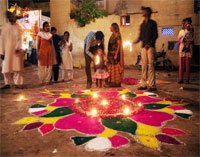
As we move towards the eastern region of the country, we can notice vivid changes in Diwali celebrations. West Bengal celebrates Kali Puja accounting to Durga's triumph over Bakrasura in the form of Goddess Kali. Bengalis perform Kali Puja on the night of Deepavali.
In Bihar and Assam, Diwali is celebrated in the same manner as in the northern part of the country. Devotees worship Goddess Laxmi and light earthen lamps ('Diyas'). Although, Orissa has its own unique way of celebration. The family members involved in the worshiping process burn the stems of jute plants, which according to them is the way to call their ancestors by enlightening the dark path.
In West Bengal, Kali Puja is celebrated on Badi Diwali. Bengalis prefer to burn the fire-crackers and also light up clay lamps and candles. The Puja of Goddess Kali is performed after the midnight and the priests adopt meticulous measures to perform it. It is also popular as Shyama Puja.
That is about our country; now, let's take a look at how Diwali will be celebrated all over the globe.
Diwali Celebrations All Around The Globe
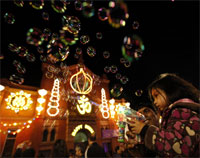
Diwali is not only celebrated in India, it has also elaborated its touch to the nations of Fiji, Malaysia, Myanmar, Singapore, Sri Lanka, Britain, Indonesia, and many more countries. In Britain, Diwali resembles a similar celebration pattern as it is done in our country. People exchange sweets among themselves and get indulged in a traditional get-together. Lamps are lit in their houses and greetings of welcoming gestures light up the whole environment. Indonesia is famous for celebrating Diwali, especially the island of Bali. Majority of the people in the island are Hindus, and the way they celebrate Diwali is the similar pattern as that of India.
Be it anywhere in world, Diwali is considered to be the festival that brings a festive aura into the air. This Diwali will again bring the same feel in the hearts of people and get them illuminated by the light of knowledge.
Hopefully, all this information on Diwali would help you out to celebrate Diwali with zeal and fun along with your near and dear ones.
AstroSage wishes you a Happy Diwali..!
Astrological services for accurate answers and better feature
Astrological remedies to get rid of your problems

AstroSage on MobileAll Mobile Apps
AstroSage TVSubscribe
- Horoscope 2026
- राशिफल 2026
- Calendar 2026
- Holidays 2026
- Shubh Muhurat 2026
- Saturn Transit 2026
- Ketu Transit 2026
- Jupiter Transit In Cancer
- Education Horoscope 2026
- Rahu Transit 2026
- ராசி பலன் 2026
- राशि भविष्य 2026
- રાશિફળ 2026
- রাশিফল 2026 (Rashifol 2026)
- ರಾಶಿಭವಿಷ್ಯ 2026
- రాశిఫలాలు 2026
- രാശിഫലം 2026
- Astrology 2026

























